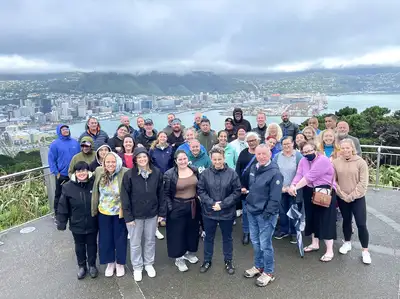Key facts
Start date: 3 to 7 March 2025
Cost: Full week: $1500 +GST. Per day: $400 +GST
Duration: 5 days
Delivery mode: In person
Location:
Massey University
Wellington campus
Wallace Street
Mt Cook
Wellington
New Zealand
Overview
This short course will explain how organisations can prepare for, respond to, and recover from a disaster. The course will begin with an introduction and review of Aotearoa New Zealand and international research and practice. The topics will then be explored through a series of relevant case studies. The final session of each module will provide practical tools and guidance for turning the theory to practice.

Who this course is for
This course is designed for those involved in all aspects of emergency management:
- planners
- educators
- engineers
- local and central government policy makers
- insurance managers
- researchers
- emergency managers
- utility and property owners.
The institute will also be part of the Massey course 130706 Emergency Management in Practice. If you are enrolled in the Massey course you will automatically be enrolled for the institute, at no additional cost. However, you do not need to be enrolled in the course to attend the institute.
Course content and structure
Day 1: Monday 3 March 2025, 9am to 4.30pm
Emergency management planning
This day will explore the range of emergency management planning processes and discuss issues that need to be addressed at a CDEM Group, community and organisational level. It will introduce the fundamental emergency management concepts and how these are applied in Aotearoa New Zealand and examine a number of recent events.
Day 2: Tuesday 4 March 2025, 9am to 4.30pm
Tangata whenua in disasters
The day will be hosted at our university marae and explore how to better understand the roles of Māori attributes (knowledge, values and practices) during disasters, drawing on some past experiences of iwi, hapū and marae.
Day 3: Wednesday 5 March 2025, 9am to 4.30pm
Developing effective all-hazard warning systems
This day will examine issues around improving the public’s response to warning systems for weather, flooding, tsunami, and other hazards. This includes co-development and participatory approaches to science development and communication, and identifying decision-relevant communication strategies.
The day will explore international examples of effective end-to end warning systems and discuss research into the effectiveness of these systems and considerations for uncertainty. It will discuss existing training approaches among emergency response agencies and ways to improve these by developing and implementing new technologies and approaches. The day will also address the role of communities in developing and maintaining effective systems.
Day 4: Thursday 6 March 2025, 9am to 4.30pm
The wellbeing of our people
Drawing on recent research in New Zealand and internationally, this day will provide an evidence-based framework for understanding how to enhance wellbeing in the light of disasters. We will discuss the role of public education (including schools), community engagement and public participation in building resilient communities. We will examine resilience initiatives for both New Zealand and overseas, and consider wellbeing for a diversity of communities. Monitoring and evaluation strategies will also be covered.
Day 5: Friday 7 March 2025, 9am to 12pm
Classroom in the coach
During this day we will undertake a field excursion to explore many aspects of emergency management planning, land-use planning and options for mitigation in the Wellington and Hutt Valley.
We will:
- visit tsunami hazard zones
- discuss tsunami warnings
- explore the Wellington fault
- look at land-use planning for earthquakes, tsunami, landslides and flooding
- examine community-based preparedness activities
- visit the GeoNet operations centre.
Meet your facilitators
This course is run by the Joint Centre for Disaster Research.
Registrations
Registrations for 2025 have now opened. Please complete a registration form for each attendee. Secure credit card payment can be made for multiple attendees or an invoice can be generated and sent to your organisation. Please contact Jeff for alternative payment options.
Contact information
